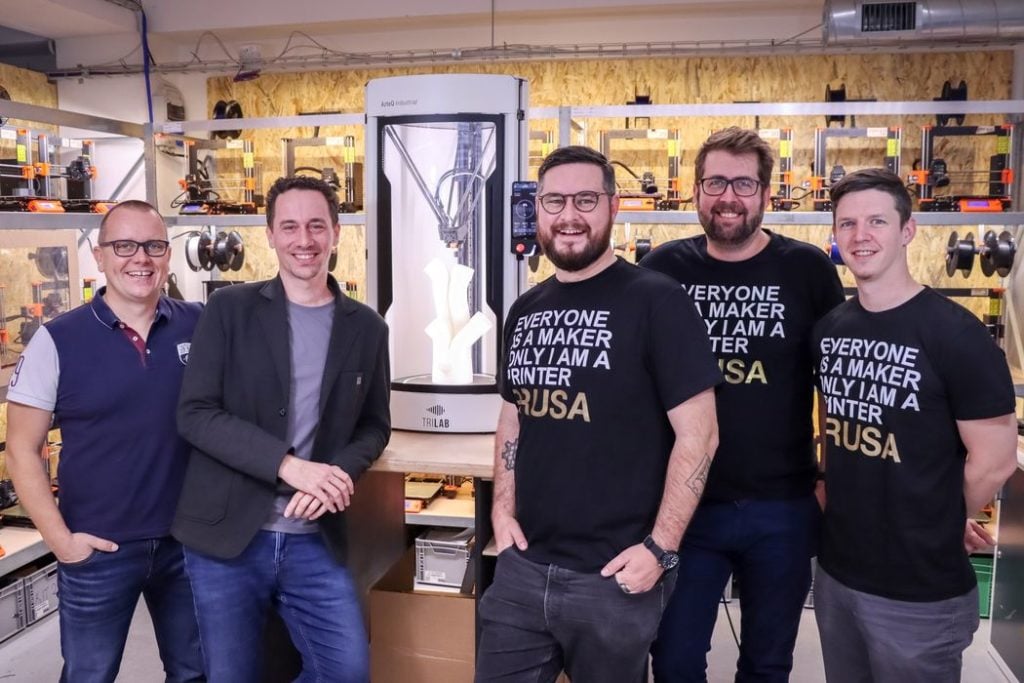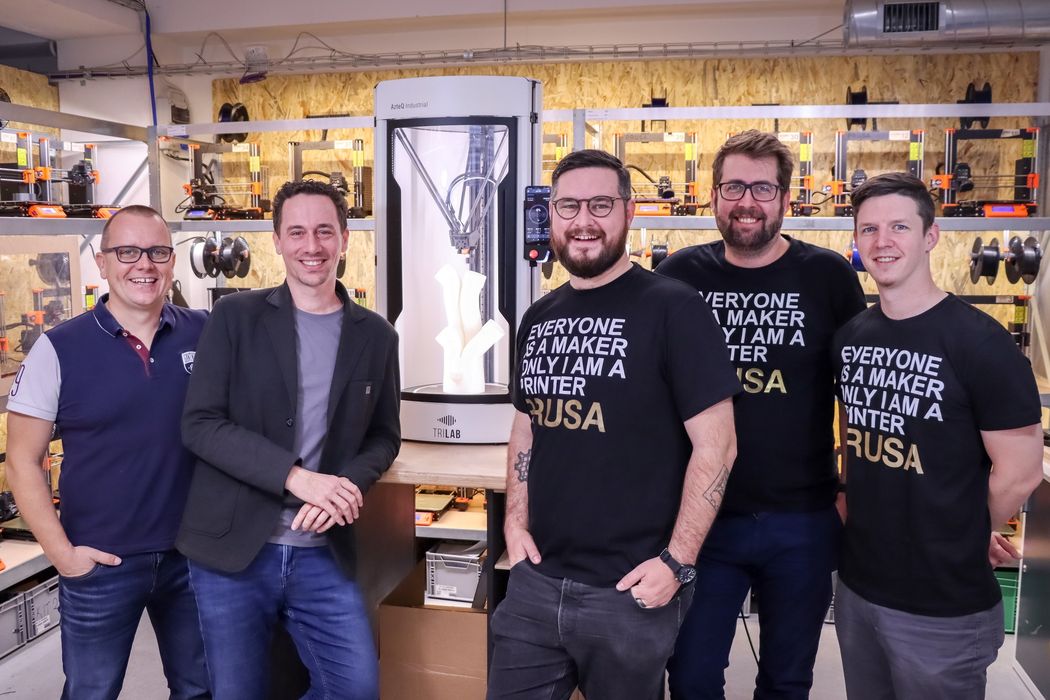
In a surprise announcement, Prusa Research announced they have acquired fellow Czech 3D printer manufacturer Trilab.
The deal sets Prusa Research on a clear path into industrial 3D printing.
If you’re not familiar with Trilab, let me bring you up to speed. They have been producing unusual delta-style 3D printers for several years, and I don’t think there are any other 3D printers quite like them.
Their key feature is a highly unusual extrusion mechanism that is both Bowden and Direct Drive, and has the advantages of both approaches. The system works by placing the motor outside the build chamber, as is normally done in Bowden systems. However, instead of turning toothed gears to push filament, the motor instead turns a rigid cable. This rotating cable then leads to the hot end, where the toothed gears actually grab the filament, just like is done in direct drive systems.
The result is a highly lightweight and problem-free extrusion system that can operate very fast on the delta motion system.
Currently, TRILAB offers two models, the Deltiq 2 and the more advanced Azteq, which sports a fully heated build chamber, allowing the use of many engineering materials. This is a unique feature for delta devices. We’ve previously run stories on both the Deltiq and Azteq equipment that have many more details.
The Azteq also includes a number of other features that would certainly be useful for AM production, including remote control, quick-swap magnetic printheads, advanced hot ends, magnetically attached print plates for different materials, and much more. It is able to reliably 3D print materials including ABS, ASA, PA, PC, PP as well as more standard materials such as PLA, PETG and CPE.
Trilab Acquisition
This is what Prusa Research is buying: a company that can produce these industrial 3D printers, using technologies not present at Prusa Research.
Prusa Research said they intend to operate TRILAB separately, as it addresses an entirely different market from their current products. Prusa Research CEO, Josef Průša said:
“Trilab produces high-quality 3D printers for the corporate sector and their brand is very well established in this area. Our machines are aimed more towards hobbyists and they are open-source. This approach may be limiting in corporate and industrial sectors.”
For Trilab, this is an enormous change. While the company produces highly competent products, they needed a boost to expand their market. That should happen as a result of this deal. Trilab CEO Michal Boháč said:
“At the beginning of 2021, we realized that if we were to expand into more markets and accelerate our growth, we needed a strategic partner. After months of negotiations with many foreign companies, we came to a somewhat surprising conclusion: the best solution is to join forces with another Czech company – Prusa Research.”
Prusa Trilab Collaboration
While Trilab will continue to operate separately, under the new name “Trilab – A Prusa Research Company”, there will certainly be much cooperation between the two organizations.
For Trilab, one obvious step is to integrate their equipment with Prusa Research’s outstanding line of 3D printer filament, Prusament. It may be possible for new types of industrial Prusament to be produced and used in the Azteq, for example.
Another area of cooperation is likely to be in print farm management. While Prusa Research has developed a farm system called AFS, currently on display at EXPO 2020 Dubai, it is possible it could be used with Trilab equipment.
I believe this to be the key part of the deal, because Prusa Research’s equipment, while very popular, is not necessarily able to produce parts for all production applications. Imagine, however, an AFS that’s made from arrays of Trilab equipment, able to 3D print precision parts in a variety of engineering materials. That’s a production factory, and surely would be of great interest to many manufacturers.
A typical benefit of a smaller company being acquired by a larger company is the ability to leverage the larger company’s larger distribution network. However, that’s not really the case here because Prusa Research’s distribution is almost entirely central.
This is a bit curious, because industrial equipment is almost always sold through local resellers that can provide rapid on-site service and assistance. It’s a way manufacturers can gain a bit of comfort when buying expensive equipment.
Trilab has a small network of resellers, but in this deal the larger company doesn’t have such a network. It’s also unclear whether many manufacturers would be interested in buying industrial equipment through a central distribution method as Prusa Research does today. Just because it works with non-industrial equipment doesn’t mean it will work with manufacturers.
On the other hand, this might be a case where the larger company leverages the smaller company’s distribution network. It’s quite possible for Prusa Research to now work with Trilab’s resellers to promote their existing line of products, especially Prusament and AFS. The added power of Prusa Research’s size may be able to dramatically grow that network further, providing a massive sales platform for both companies.
This is an incredibly important move for both companies, although it is a bit unusual. It opens a clear path for Prusa Research to move strongly into the manufacturing sector, where there is an enormous market.
Via Prusa Research and Trilab

